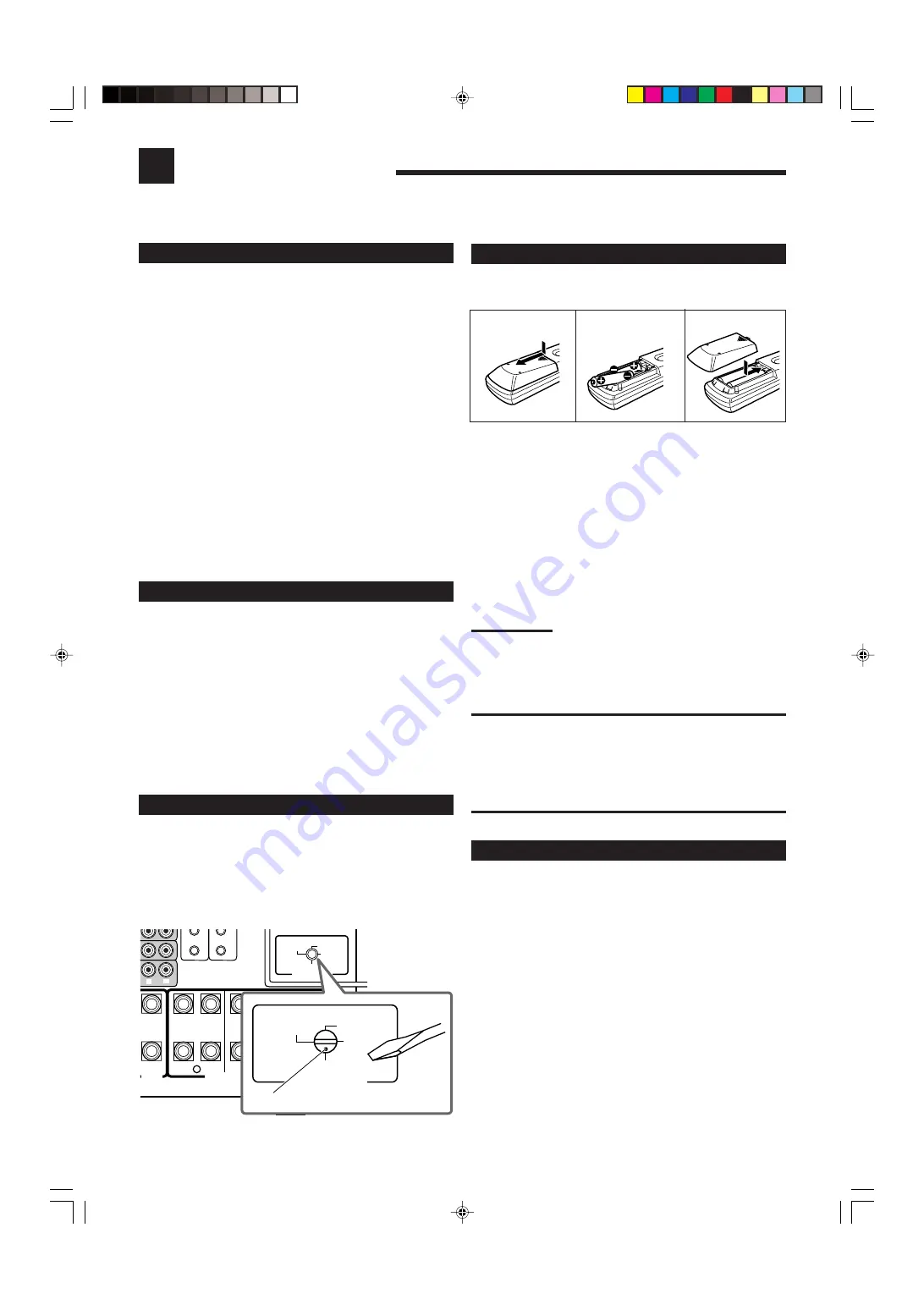
7
Putting Batteries in the Remote Control
Before using the remote control, insert the two supplied batteries
first.
1. Press and slide the battery cover on the back of
the remote control.
2. Insert the batteries.
• Make sure to match the polarity: (+) to (+) and (–) to (–).
3. Replace the cover. If the remote control cannot
transmit signals or operate the receiver correctly,
replace the batteries. Use two R6P(SUM-3)/
AA(15F) type dry-cell batteries.
Notes:
• Supplied batteries are for the initial setup. Replace the batteries for
continued use.
• After replacing the batteries, set the manufacturers’ codes again
(see pages from 45 to 47).
CAUTION:
Follow these precautions to avoid leaking or cracking cells:
• Place batteries in the remote control so they match the polarity:
(+) to (+) and (–) to (–).
• Use the correct type of batteries. Batteries that look similar may
differ in voltage.
• Always replace both batteries at the same time.
• Do not expose batteries to heat or flame.
Connecting the FM and AM Antennas
FM Antenna Connections
A. Using the Supplied FM Antenna
The FM antenna provided can be connected to the FM 75
Ω
COAXIAL terminal as temporary measure.
B. Using the Standard Type Connector (not supplied)
A standard type connector should be connected to the FM 75
Ω
COAXIAL terminal.
Getting Started
This section explains how to connect audio/video components and speakers to the receiver, and how to connect the
power supply.
Before Installation
General Precautions
• Be sure your hands are dry.
• Turn the power off to all components.
• Read the manuals supplied with the components you are going to
connect.
Locations
• Install the receiver in a location that is level and protected from
moisture.
• The temperature around the receiver must be between –5˚C and
35˚C.
• Make sure there is good ventilation around the receiver. Poor
ventilation could cause overheating and damage the receiver.
Handling the receiver
• Do not insert any metal object into the receiver.
• Do not disassemble the receiver or remove screws, covers, or
cabinet.
• Do not expose the receiver to rain or moisture.
Checking the Supplied Accessories
Check to be sure you have all of the following items, which are
supplied with the receiver.
The number in the parentheses indicates quantity of the pieces
supplied.
• Remote Control (1)
• Batteries (2)
• AM Loop Antenna (1)
• FM Antenna (1)
• AC Plug Adaptor (1)
If anything is missing, contact your dealer immediately.
Adjusting the Voltage Selector
Before connections, always do the following first if necessary.
Select the correct voltage with the VOLTAGE SELECTOR switch
on the rear using a screw driver.
Check to be sure if the voltage mark is set to the voltage for the area
where you use this unit.
1
2
R6P(SUM-3)/
AA(15F)
3
110V
127V
230-240V
220V
VOLTAGE SELECTOR
+
–
1
2
CENTER
SPEAKER
P
B
P
R
FRONT SPEAKERS
RIGHT
LEFT
RIGHT
LEFT
CAUTION : SPEAKER IMPEDANCE
1
OR
2 :
8
16
1
AND
2 :
16
32
110V
127V
230-240V
220V
VOLTAGE SELECTOR
Voltage mark
Continued on the next page
01_14_8030[UJ]f.p65
03.6.17, 8:21 PM
7










































